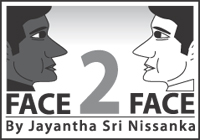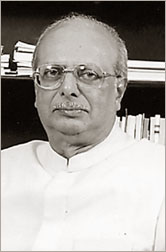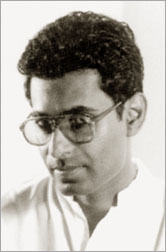|
observer |
|
|
|
|
|
OTHER LINKS |

|

|

|
Controversy on Expert Committee reports
Q:What is this division in the Expert Committee appointed to assist the All Party Representatives Committee (APRC)?
Prof. Tissa Vitharana: Expert Committee has come out with two interim reports after much discussion and deliberations. Eleven members have signed the Report A and four members signed the Report B. Two other members have not signed either of the Reports and they have indicated in two separate letters as to why they did not sign. Now two reports are before the APRC. Now we have to continue with deliberations taking into consideration the views expressed by Committee members. Champika Ranawaka: Every one should know that the Expert Committee was appointed by the President in order to assist the APRC when they are faced with legal problems. The Expert Committee was not appointed by the APRC and entrusted to formulate any report. They did it on their own without any recommendation from the APRC. Q:Will the APRC accept any one of the reports to formulate a devolution package? T.V: We don't need to accept either report. But this is a matter to be discussed by the representatives. A common position could be arrived at. For instance, the two reports accept that the unit of devolution should be the Provinces. Of course, there are differences on detail points. So, we will have to discuss and formulate a common position now. C.R: Who asked them to formulate reports? Nobody. So there is no legal validity in their reports. We cannot accept these two reports because there are certain areas many members in the APRC cannot agree. Majority report is a conspiracy. This concept of federalism was rejected and people defeated federalism, promoter Ranil Wickremesinghe at the last Presidential Election and elected Mahinda Rajapaksa. The main issue during the election was not about economy, cost of living or any other thing but whether the country is Unitary or United. Q:Is the Expert Panel useful to the APRC? T.V: They spent lot of time and put more effort to come out with ideas. It would have been better if they presented one report. However, we need to narrow these differences as much as possible to reach a common position. We should narrow the gap and come out with ideas acceptable to the majority of the parties. Of course, it is very difficult to get 100% support for any solution. I was disappointed when the JVP decided to withdraw from the APRC because of the reports submitted. Hasty decisions should not be taken on these issues. We must reach a decision acceptable to a wider range of people if we want to move forward as one nation. C.R: First of all there is no balance in this Committee. We proposed two names but they were not appointed. We are unhappy about certain members in the Committee because they work according to some given agendas. Q:Do you ever think that the APRC could formulate a devolution package to the North and East (N&E) in complying with the policies of the JVP and JHU? T.V: This is something we have to discuss at length. Already we are working with devolution after the 13th Amendment was introduced. But many are unhappy, the way it was introduced. We studied the Panchayath system in India. It is a good system to introduce to our country, which can take devolution right down to the village level. We have to empower people with out getting lost in words whether unitary or federal. C.R: We are not extremists. The LTTE is following Neo Nazism. They are the extremists. Have we killed people like them? The so-called intellectuals are dumb about the atrocities of the LTTE and they indirectly support the LTTE view. There are certain members in the UNP and the Muslim Congress too with the LTTE ideology. Norway and other western countries too support them. How can any body point fingers at us. Q:One of the fundamental problems people always saw was that the major opposition party always opposed to any solution introduced by the Governments in the past. Now, we have a golden opportunity as the UNP has pledged to support a solution to the national question. These two parties muster the two third of votes. So will you exploit this opportunity to bring a solution? T.V: I fully agree with you. I am extremely happy that the UNP and SLFP came to an agreement giving the foremost place to solve the national question. These two parties need to work on a consensus. But the discretion of minorities on religion, racial and political opinions are not that much represented in these two parties. Efforts must be taken to accommodate their aspirations. Of course, the two major parties can come to a common position but should not override the views of others. C.R: Two thirds of the Sinhala Buddhists voted for Mahinda Rajapaksa and defeated federalist Ranil Wickremesinghe in order to keep this country as a federal free state. Sinhala Buddhists elected Rajapaksa defeating the candidate of Norway, America, businessmen and minorities. These elements spent Rs.3 billion on their candidate. If anybody forces us to takes up arms against separatism, we do not fear to do it. Like Keppetipola we will fight for the country. I was one man who fought in 1987 against the Indo Lanka accord. They should not test our patience. Q:Earlier, we borrowed the Provincial Council system from India. Why are we copying various systems designed to suit other countries. Panchayath system is an administration system, which is used in a feudal society. Just because it is still practiced in very remote villages in India, do you think that it will be a solution to the North and East problem? Will the LTTE accept such a weak administration giving up arms after 25 years? T.V: The Expert Committee accepted that the unit of devolution should be provinces. That is acceptable to all including the LTTE. Certain powers will be with the Center and others will pass down to Provinces. Then Provinces will pass certain powers to village level. It is true that we can't blindly apply the Panchayath system. We have to modify it to suit our requirements. For each level, we have to clearly define powers, funding, administrative apparatus to carry out those functions. Under the 13th amendment, Center and Provinces needed agreement on the Concurrent list. Funding was controlled largely by the Center and funds were not properly released to Provincial Councils. So the proposed solution should overcome these obstacles. C.R: Yes, Indian models are not workable here. It was King Pandukabhaya who introduced the Grama Rajya (Gam Sabaha) 2000 years ago. Chola invaders conquered Sri Lanka, they copied our system and introduced India as the Panchayath system. We had the Gam Sabaha system till 1991 and President Premadasa abolished it by introducing the Pradeshiya Sabha system. Q:As solutions to the North and East, Bandaranaike- Chelvanayagam, Dudley- Chelvanayagam, District Development Council, Mangala Munasinghe Select Committee formula, Indo- Lanka accord, Unions of Regions in 1996 and Draft Constitution in 2000 were introduced. So do you think that the proposed solution should be improved over the previous patterns? T.V: Yes. The degree of devolution should extend decision-making powers and functions to the Province. Though different ideas were mooted at different times, there are shortcomings and good points as well. We should formulate a system extending maximum decision-making powers. That is what we have to develop. There are fears that when we allocate powers to provinces they will disintegrate in the future. Like India, we need to safeguard such a move. We have to strike a balance. After APRC members studied the Panchayath system in India, they felt that we have not given adequate powers under the 13 Amendment. Devolution of powers are done more effectively in India. India has introduced safeguards to prevent disintegration of provinces. C.R: Except the District Development Council solution, all other solutions were the decisions of so called leaders and few of their men. That was the reason for the failure of such solutions. That happened because such solutions were not put before the people. The first All Party Conference (APC) appointed by President J. R. Jayewardene formulated the District Development Council solution after wide discussion. All members of the APC Ven. Madihe Pangnasee, Sirimavo Bandaranaike, Rohana Wijeweera, Appapillai Amirthalingam and late S. Thondaman agreed to the District Development Council solution. It was the LTTE that sabotaged the implementation of this solution. Nobody talked about it. Q:Most of the devolution packages include giving land, Police and many other powers to provinces. This is there in the Indian federal system also. Will this be a threat to the national security or a phobia among certain political parties? T.V: Certain Police powers are required to carry our provincial administration. National Police will carry out other activities. I believe we have to clearly demarcate powers. But what is important is to discuss on these issues. C.R: How can we give North and East lands to a racist administration in the North and East? We have to develop these lands. It is no point taking about what powers we have to give to the North and East administration unless we destroy the LTTE. They will never accept any solution. Q:We have wasted so much of time and resources to find a solution to the North and East problem in the past. Some meetings went indefinitely until such Governments concluded their terms. How long this APC will function is the question? T.V: It is very difficult to set a time frame for such a discussion, which involves so many vital. This is a process or a dialogue that it needs exchange of views. I hope the people will not try to drag their feet. Let us see the progress. C.R: Such a meeting requires careful study of proposals presented and exchange of views. Therefore, it requires time. People have defeated solutions, which were not widely discussed. Q:The Tamil people struggled nonviolently to win their rights during the first 25 years after independence. Then some factions turned to a violent struggle during the last 25 years. Some blamed that the Sinhala majority is responsible for it. What is your view? T.V: I will say Yes or No to both. It was not only the LTTE who took to arms. The EPRLF, PLOTE, EROS and some more organizations follow that pattern. But many organizations gave up arms after introducing the 13 Amendment. So whichever is right and wrong, the LTTE is able to continue the armed struggle because we have not addressed the aspirations of the Tamils. If we can formulate a viable solution, like other parties, the LTTE will also give up arms. C.R: When Moghuls invaded India, Tamil leaders escaped to Sri Lanka. Sinhalese are generous people. We allowed them to stay in the North. Otherwise, I challenge anybody to show me evidence of a Tamil homeland in Sri Lanka. In order to create problems, imperialists gave special privileges to Tamils. In addition, they created another problem bringing estate Tamils from India. 90% of the Sinhalese had one representative and 9% of Tamils had one. Tamils thought that they could rule us. Once Ponnambalam Arunachalam stated that they wanted to rule us in 1910. |
 Minister and
Prof. Tissa Vitharana emphasized that the two reports of
the Expert Committee appointed to assist the All Party Representative
Committee should study it. And Jathika Hela Urumaya Policy Formulator
Champika Ranawaka claims that the Expert Committee had no authority
prepare any report and therefore it should be discarded.
Minister and
Prof. Tissa Vitharana emphasized that the two reports of
the Expert Committee appointed to assist the All Party Representative
Committee should study it. And Jathika Hela Urumaya Policy Formulator
Champika Ranawaka claims that the Expert Committee had no authority
prepare any report and therefore it should be discarded. 









